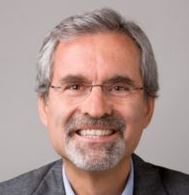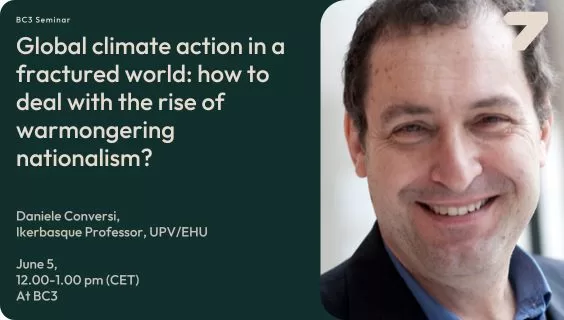BC3 Seminars: Spatial and temporal variabilities of land uses as affected by global change: a focus on Mediterranean agriculture
Prof. Carlo Giupponi,
Director of The Venice Centre for Climate Studies (VICCS) and the brand new dean of the Venice International University.
At the global level, climate and socio-economic changes determine the patterns of the allocation and trade of resources in all markets. Top-Down computable general equilibrium (CGE) models look at the effects of global trends and generate trajectories of socio-economic indicators, such as prices of commodities in the global markets, volumes of trades, gross products per country and sectors. Those models are commonly used to analyse the evolution of global economies, under the pressure of climate change drivers, but their approach impose substantial simplifications in terms of spatial aggregation and interactions between socio-economic and environmental variables. When considering adaptation of social and ecological systems to climate change, their inherent complexity and non-linearity and their spatial and temporal variabilities put the usefulness of consolidated CGE approaches under question for long term projections. As a consequence, other methodological approaches are explored, and in particular more and more scholars explore Bottom-Up approaches, utilising mechanistic knowledge of physical/environmental phenomena and/or considering the behavioural diversity of economic agents, as a consequence of their diverse interactions with the surrounding environment and their bounded perceptions of the changing world. This work explores the potential for integration of the T-D and B-U approaches, with CGE models providing the macro-economic trends under the effects of global change scenarios and agent-based models (ABM) simulating grid-based land use change dynamics, with consideration of spatial (i.e. territorial) and temporal (e.g. climatic extremes and economic shocks) variabilities. We develop an approach that could be implemented worldwide as a means for zooming down from the global to the regional and local scale. The ABM prototype was developed and run with readily available global databases in three test areas around the Mediterranean Basin, in agricultural regions of Tunisia, Italy and Spain. Starting with extremely simplified and averaged settings; we sequentially introduce the available information about spatial and temporal variability and simulate the dynamics of water and land-use allocations and their consequences on economic performances. The coherency of the outcomes of ABM simulations with the macro trends provided by the CGE model is discussed in view of possible further developments in terms of improved integrated multi-scale simulation of global change scenarios and economic development.
Prof. Carlo Giupponi visits BC3, Seminar 2, June 9
Water is considered the bloodstream of the biosphere, but its management is one of the most important challenges for human development. In view of the sustainable water management, several approaches have been proposed: Integrated Water Resources Management (IWRM), Adaptive Management (AM) and, more recently, Water-Energy-Food (WEF) Nexus. Considering these approaches, over the last few decades extensive efforts have been made to develop assessment methods and tools framed within the paradigm of sustainable development. As part of a holistic assessment of water resources, the recent approach based upon the WEF Nexus narrows down the consideration of intersectoral linkages to three dimensions that are of prominent interest, in particular in developing countries. This study presents a comprehensive indicator-based approach for the assessment of water, energy and food securities, with reference to the Sustainable Development Goals of the United Nations. The main ambition of the proposed approach is to provide a tool to monitor progresses, compare different geographical areas, highlight synergies and conflicts amongst and within the three dimensions of the WEF Nexus, and provide support for improved – more effective – management strategies to meet the goals. The proposed approach has been applied to global data sets in a GIS environment and it is demonstrated in a forthcoming paper in the Ganges-Brahmaputra-Meghna (GBM) River Basin in Asia and to the Po River Basin in Europe. The comparative analysis suggest that WEF security is currently rather low in the GBM basin compared to the other case study and other parts of the world, and allows the identification of which dimensions (indicators) require special attention on the part of local and global policy makers.
BC3 seminars: City Resilience: just do it?
Lorenzo Chelleri
Postdoctoral Research Fellow, Gran Sasso Science Institute
Urban Research Unit, L’Aquila, IT.
In line with the recent threats and challenges framed around climate change adaptation and mitigation, the concept of resilience applied to cities navigated through a first successful wave of policy discourses and initiatives. However, after crashing against a recent but increasing number of critics, from different disciplines, a second wave is trying to re-establish the reliability of resilience by proposing a critical mass of city resilience assessment tools. These are providing indicators and weights for a more cautionary and effective way of building resilient cities. This talk speculates around the application of those metrics, explaining through different case studies (Barcelona, on critical infrastructures and L’Aquila, on post-disaster reconstruction governance) how integrated resilience metrics are often biased from, since based on, others concepts’ indicators, showing that i) resilience is still, after its first wave of metaphorical meanings success, an overall umbrella for different city policies and ii) resilience principles (mostly rooted in social, ecological sciences and engineering) still lack consistency for being operationalized in urban systems.
BC3 Seminars: Global fishery futures under contrasting management regimes and climate change
Christopher Costello
Professor Resource Economics
While there is broad agreement that resources are valuable and need to be used wisely and sustainably, there is less agreement on the definitions of such terms as “wisely” and “sustainable,” meanings that evolve within the context of identifying society’s objectives and creating the mechanisms and policies to achieve them. Professor Costello works in this area, focusing on the economics of environmental regulation and natural-resource management under conditions of uncertainty (inaccurate, unavailable, or contradictory information), with a particular emphasis on the value and effect of information on management decisions. Correlate to this is his interest in adaptive-management programs that have a learning component intended to resolve uncertainty. He has applied this perspective to studies in biological diversity, introduced species, regulation of polluting industries, and marine policy.
BC3 Seminars: Beyond the targets: Assessing the political credibility of the NDCs under the Paris agreement?
Dr. Alina Averchenkova
This paper develops a framework for the analysis of the political credibility of nationally determined contributions (NDCs) to the Paris agreement. This framework is used to provide an initial assessment of the credibility of NDCs pledged by G20 countrie
BC3 Seminars: Diverging coal phase-out strategies and their implications for EU Climate & Energy policies
BC3-Basque Centre for Climate Change Sede Building 1, 1st floor, Scientific Park of the University of the Basque Country, Leioa, Bizkaia, SpainHanna Brauers
Master students at Technische Universität Berlin and Research assistant at German Institute for Economic Research
Hanna will present the current state of her master thesis about the coal phase-out (or expansion) strategies of three representative EU states, namely the United Kingdom, Germany and Poland. To maintain the chance of limiting global warming to 1.5°C and to fulfil the EU’s greenhouse gas reduction commitments, all countries will have to phase-out electricity generation from coal as soon as possible. Nevertheless, coal strategies diverge from phase-out to expansion, creating another divide between Eastern and Western European countries. The aim of the thesis is to analyse reasons for the disparate developments and to derive policy recommendations on how an EU-wide coal phase-out can be furthered.
BC3-UPV/EHU Summer School 2016: “Climate Change Challenges after Paris agreement”
Miramar Palace Paseo Miraconcha, 48, San Sebastian, Gipuzkoa, SpainThe objective of the summer school is to offer an updated and recent view of the ongoing trends in Climate Change research in an annual basis. The BC3 Summer School is organized in collaboration with the University of the Basque Country and is a high quality and excellent summer course gathering leading experts in the field and students from top universities and research centres worldwide.
This seventh edition of the Summer School will continue with the multidisciplinary approach and will focus on the Climate Summit results in Paris.
BC3 Seminars: The Norwegian electric car policy; environmental friendly or an economic disaster?
BC3-Basque Centre for Climate Change Sede Building 1, 1st floor, Scientific Park of the University of the Basque Country, Leioa, Bizkaia, SpainProf. Anders Skonhoft
Norwegian University of Science and Technology
As a result of generous policies to increase the use of electric vehicles (EVs), the sales of EVs in Norway is rapidly increasing. Due to the subsidies, driving an EV implies very low cost to the owner on the margin, probably leading to more driving at the expense of public transport and cycling. Moreover, because most EVs´driving range is low, the policy gives Norwegian households incentives to purchase a second car, again stimulating the use of private cars instead of public transport and cycling. These effects are analysed in light of possible benefits of utilizing EVs versus conventional cars.
Presented his Research Line
BC3-Basque Centre for Climate Change Sede Building 1, 1st floor, Scientific Park of the University of the Basque Country, Leioa, Bizkaia, SpainProf. Joan Sabaté
LOMA LINDA
University School of Public Health (California, USA)
BC3 has in place a program called BC3 Visiting Programme under the attainment of its strategic objectives, Talent Attraction.
The aim of this programme is to promote research and dialogue between BC3 and other worldwide leading institutions, by supporting and hosting local and international professors wishing to undertake research at BC3.
BC3 Seminars: Demand and supply assessment of ecosystem services in the case of Japan
BC3-Basque Centre for Climate Change Sede Building 1, 1st floor, Scientific Park of the University of the Basque Country, Leioa, Bizkaia, SpainProf. Kiichiro Hayashi
Institute of Materials and Systems for Sustainability Division of Systems Research, Nagoya University, Japan.
Makoto Oba
Principal researcher of National Institute for Environmental Studies, Japan.
This study focuses on the assessment of the provisioning potential of ecosystem services(ESs) and the demand assessment of ESs by GIS. The case study was conducted in Aichi prefecture, Japan, focusing on forest ESs. First, spatial distributions of forest ecosystem services were estimated by using process models at regional-scale. The process-based ecosystem model predicts quantitatively material cycles and growth of biomass with change of forest management. Second the demand and beneficiary spatial distributions were estimated by several questionnaire surveys. The study site included not only source forest towns but also surrounding municipalities for beneficiary distribution mapping. Third these results were overlying by utilizing GIS. After overlaying each ES map, the ES demand and supply relation were studied. Based on the results, a low-carbon policy can be suggested for promoting energy-use of woody biomass and carbon stock of buildings in socio-system.







